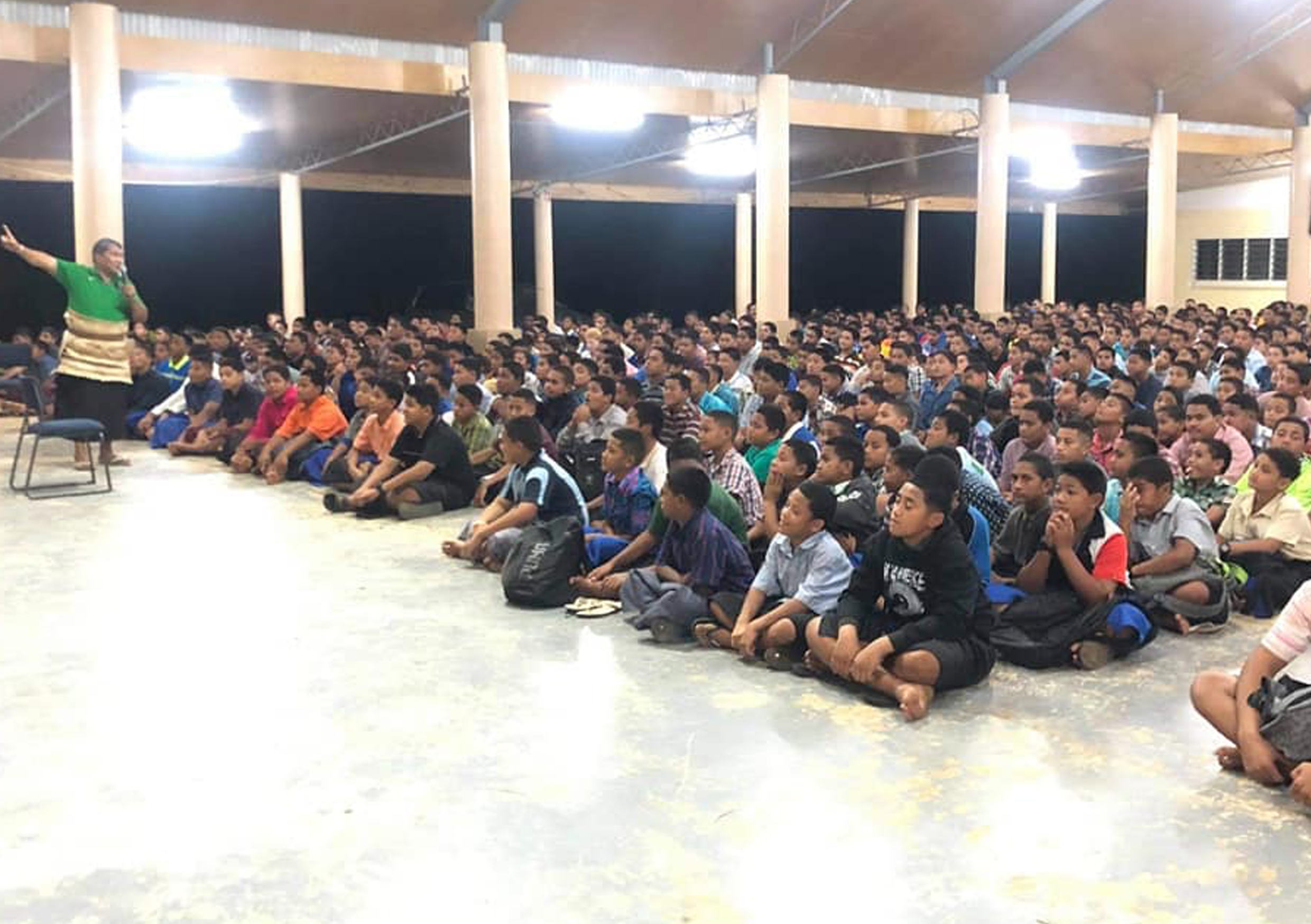b l o g
d e c e m b e r 2 0 2 0

Rev. Tuluta Fisi’ihoi, the Head of Agricultural Studies of Tupou College in Tonga addresses close to 1000 students on Growers Federation Of Tonga’s Good Agricultural Practice IMAGE: Growers Federation Of Tonga
By Heiko Bammann, Agriculturalist Economist, Agrifood Economics Division, FAO Headquarters, Rome
PIFON has been on a great voyage since its beginning in 2008. With European Union and ACP funding, the Food and Agriculture Organisation of the United Nations (FAO) has supported farmer organisation and its networks in Africa, the Caribbean and the Pacific to form into professional entities, with strong governance structures and sustainable business models. While organisations in the other two regions have struggled to maintain the momentum created, the developments in the Pacific have been outstanding. From an initial founding group of just a handful of interested national organisations, the network has grown four times in size across the vast Pacific Island region – with scope for more! PIFON’s technical, business and management support is provided through i.e. high quality experts advice and famer-to-farmer knowledge exchanges. We can follow and learn from each other on the excellent PIFON web page and through media like this Blog, you are just reading.
This article highlights a pressing issue around the world: the role of youth in agriculture. It points out to resources also available to the Pacific to learn from and take advantage of the information available through the internet and on social media. FAO has an important role to play as knowledge broker and in sharing experiences, from implementing programs to empower youth taking part in policy decision making processes and playing an active role in the transformation of the agriculture sector. This transformation process offers huge opportunities for the youth.
Agriculture in the Pacific is more than the occupation of the great majority of people; it is their satisfaction, the means by which what survives of tradition is largely expressed and maintained, and the channel of individual creativity and enterprise within traditionally close confines of the extended family and community. (Barry Weightman, 1989).
Traditional farming and food systems in the Pacific have shown great resilience to natural disasters such as cyclones, floods, droughts, earthquakes, volcanic eruptions, and tsunamis, as well as to economic shocks, like the food price increase at the time PIFON was formed. However, the COVID-19 crisis is a new dimension of “shock” and shows us the limitations of modern Food Systems. Todays’ Food Systems in the Pacific islands are highly influenced by global food trade (through food imports and exports) and other sectors. They depend highly on mobility, trade and accessibility to inputs and resources from elsewhere.
Fortunate are the Pacific island countries with still strong traditional farming structures, where youth have learnt from their families how to grow and process food. This has been and still is often seen as a burden and disincentive to take on a “career in agriculture”. It has driven many rural youth away to the cities and towards so called “white collar jobs”. However, agriculture has remained part of the culture in many island countries and that has been the basis to ensure family food security, and steady food supplies to villages and the country as a whole at the time COVID-19 hit. In small atoll islands or islands where agriculture structures have declined, the crisis has hit hardest!
PIFON is also working with youth and women groups to improve productivity of farm enterprises, local processing and domestic marketing. The transformation will take place, todays educated youth have a unique opportunity to combine traditional practices with modern skills, play an important part in this transition and build up new livelihoods for many.
Even more so than in the traditional days, the transformation of food system need educated youth, apt to use modern communication tools, navigate the “digital divide”, deal with the business partners and prepare financing proposal for investing in farm enterprises and other agribusinesses. That alone however, is not enough, Governments have to understand the needs of young entrepreneurs in agriculture, also known as “agri-preneurs” and adjust rules and regulations to enable youth to get access to finance, to land and information, in order to ensure sound planning translates into business earnings and much needed employment.
The call is to reduce barriers and think of smart policies and incentives that can provide the basis for youth to establish businesses. COVID-19 has shown changes in production and marketing structures: digital sourcing with limited contacts between farmer and first buyer when exchanging produce, quick installation of infrastructure at consolidation points, mobile vendors delivering produce to the end consumer to name just a few. Examples are plenty, and youth have (why have?) and will play a role in contributing to Pacific islands prosperity based on opportunities existing in the agriculture sector.
FAO global knowledge networks provide ready access to information for organisations and governments, but also individual youth to learn about supporting policies, technologies and on how to do business. Examples of such information hubs and web sites of interest for youth include: Sustainable Food Value Chains Knowledge Platform, Youth Employment; Young Professionals for Agriculture Development YPARD); FAO Youth and United Nations Global Alliance (YUNGA); Supporting Responsible Investments in Agriculture and Food Systems (RAI), Digital Agriculture.
Youth is one of PIFON’s six work areas. To the to young women and men: make your voices heard and take advantage of the services provided by PIFON, SPC, national bodies and private sector organisations and get support to transform your faming and agribusiness ideas into reality. Learn your trade and engage with market players to tap into the emerging opportunities the growing agri-food markets offer.
Hyperlinks explained:
Sustainable Food Value Chains Knowledge Platform: http://www.fao.org/sustainable-food-value-chains/home/en/;
Youth Employment: http://www.fao.org/rural-employment/work-areas/youth-employment/en/
FAO Youth and United Nations Global Alliance (YUNG): http://www.fao.org/yunga/resources/en/
Young Professionals for Agriculture Development (YPARD): https://ypard.net/
Supporting Responsible Investments in Agriculture and Food Systems (RAI): http://www.fao.org/in-action/responsible-agricultural-investments/our-work/empowering-youth/en/
Digital Agriculture: http://www.fao.org/digital-agriculture/en/
